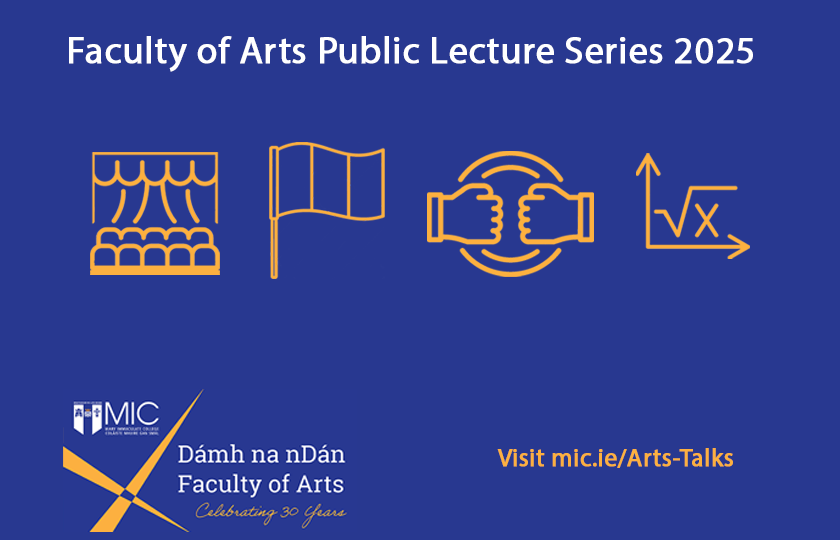
The Faculty of Arts at Mary Immaculate College (MIC) is to host a free public lecture series. Taking place over several consecutive Thursdays in February and early March, the series will showcase the wide range of research interests and expertise within the Faculty.
This series of five lectures, which begins on Thursday 13 February, will explore topical issues such as the relationship between theatre and society, the history of our national anthem(s), why some people struggle with maths and the possible connection between fighting and belonging.
Prof. William Leahy, Dean of the Faculty of Arts at MIC, emphasised that all are welcome to attend these stimulating talks:
“Following the success of the last two series of public lectures in 2023 and 2024, the Faculty of Arts at MIC will once again host four lectures at 6pm on consecutive Thursdays in February and March aimed at a general audience. These lectures will focus on key contemporary and historical issues and will demonstrate the excellence of research and disciplinary expertise of academic colleagues in the Faculty of Arts. The lectures will be accessible, interesting and thought-provoking. All are welcome!”
Lectures are open to all members of the public, starting at 6pm each evening and taking place in room T118 in the TARA Building at the MIC Limerick campus.
See more details on the events below and register your attendance here.
Full details on the 2025 Public Lecture series and registration are available here.

Faculty of Arts Public Lecture Series 2025
On 13 February, Dr Mike Finneran (Head of the Department of Drama & Theatre Studies), will speak on ‘Why theatre matters: acting and stories as social imperatives’.
Description: The word theatre is at once familiar and exotic: it invokes darkened rooms, heightened emotions and talented performers. For the majority, it is an occasional pleasure, sampled deeply but rarely. This talk will explore the unique relationship between theatre and Irish society. It will draw upon the distinctive social contribution drama and theatre offer by probing the relationship we have with performance, especially in Limerick. By exploring a series of plays and performances, the case will be made that the theatrical and dramatic are not just a matter of entertainment, but essential to societal well-being: in dealing with the increasing ambiguity of the world; reconnecting ruptured aesthetic traditions; inculcating community cohesion; and telling stories of the past and future.
On 20 February, Music lecturer, Dr Michael Murphy, will deliver: ‘Claiming the National Anthems of Ireland: God Save the King and Amhrán na bhFiann’.
Description: The island of Ireland currently has two national anthems. ‘God Save the King’, which was first sung in Ireland in the mid eighteenth century, was regarded as the de facto national anthem throughout the country until the Government of Ireland Act of 1921 created the Irish Free State and Northern Ireland. After partition, the British anthem was retained by the unionist/loyalist community in the North. Between 1924 and 1926, the Irish Free State adopted ‘A Soldier’s Song’ (later known as ‘Amhrán na bhFiann’) for the Irish national anthem. This talk will explore how various parties, with opposing political agendas, claimed those anthems as their own: namely, how Daniel O’Connell deployed ‘God Save the King’ in his attack upon the Orangemen, and how each of the civil war parties claimed the ‘Soldier’s Song’ as their own in the 1920s.
On 27 February, Dr Liam Kelly of the Department of Theology & Religious Studies, will expand upon ‘What’s the story with violence? Why we always fight and why we can’t stop. Looking at Violence and Belonging with René Girard’.
Description: Whether it is our personal histories of violence or the numerous ongoing global conflicts, violence looms large in human experience. In this lecture I will explore the ideas of René Girard, the French-American author famous for his ‘scapegoat theory’ and his hypothesis that violence is what brings us together, just as much as it drives us apart. I will explore the role of mimesis/imitation in violence and ask whether, according to Girard, humans can ever hope to escape violence?
On 6 March, Maths lecturer, Dr Maria Ryan, will shed light on: ‘Lost in the numbers: Confronting the struggle with maths’.
Description: Why do so many of us struggle with mathematics? From anxiety-inducing school experiences to social perceptions about natural ability, the barriers to mastering mathematics can be deeply rooted. Anxiety around mathematics (or mathematics anxiety) affects countless individuals, creating fear, avoidance, and self-doubt that hinder academic and personal growth, and undermine the potential for using mathematics in everyday life. This lecture explores the roots of our struggles with mathematics; from psychological barriers and societal myths to challenges in teaching and learning. Through relatable insights and interactive strategies, it promotes a resilient approach, reframing mathematics as an accessible and essential tool for understanding and engaging with the world.



